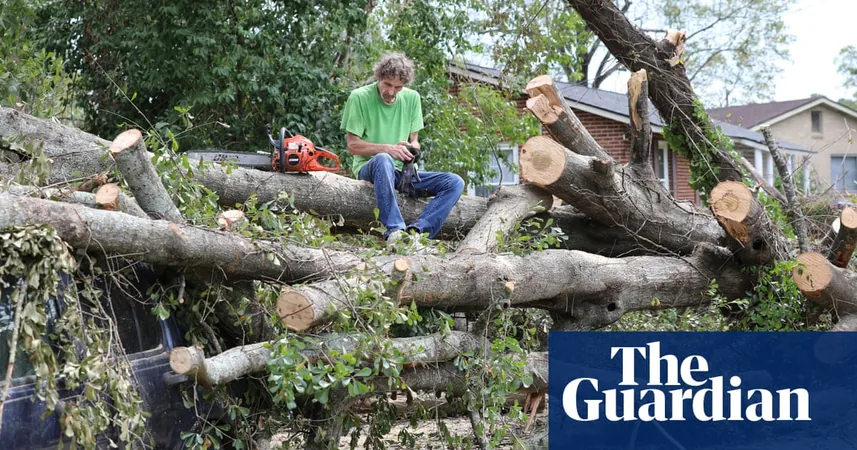
Augusta National Rises from the Ashes: The Remarkable Recovery After Hurricane Helene
2025-04-08
Author: Wei
Introduction
Hurricane Helene roared ashore in Big Bend, Florida, during the early hours of Friday, September 27. Having been tracked closely by meteorologists at the National Hurricane Center for a week as it powered towards the US from Central America, it escalated into a formidable storm. In preparation, Georgia's Governor Brian Kemp declared a state of emergency on Tuesday, highlighting the serious potential impact on the entire state.
Unexpected Impact in Augusta
Despite the dire warnings, Augusta, located in the eastern part of Georgia, felt a sense of security, having not faced a hurricane in nearly a century and believing the storm would pass safely by. However, Helene took an unexpected turn, racing north-northeast and striking Augusta with winds exceeding 100 mph. The storm's ferocity was so intense that the equipment at Augusta Airport failed at 82 mph, just as power outages began to cripple the area. The National Weather Service described Augusta as sitting right beneath the storm's most violent core, unleashing more than a foot of rain in just a few hours—a deluge that caught residents off guard.
Devastating Aftermath
The aftermath was devastating. Tragically, over 30 lives were lost in the region, with casualties resulting from falling trees and complications arising from power outages, severely affecting those reliant on medical equipment. Hundreds of homes were destroyed or severely damaged, leaving countless families grappling with the destruction as the city began a slow recovery process.
Recovery Efforts
Six months post-Hurricane Helene, Augusta continues to rebuild. An immense undertaking has seen nearly 3 million cubic yards of debris cleared from city streets. The cleanup is still ongoing, particularly in suburban neighborhoods such as those along Tobacco Road. Visible remnants of the storm are everywhere—damaged fences, uprooted trees, and homes still covered in tarpaulins. The Federal Emergency Management Agency's reduction of relief funds in February has further complicated recovery efforts.
Support from Augusta National Golf Club
Historically, Augusta has had a complicated relationship with the prestigious Augusta National Golf Club, situated on a hill overlooking the city. However, following the hurricane, the club stepped up, providing significant financial aid, including a $5 million donation to local relief efforts. Club chairman Fred Ridley emphasized the importance of community support during tough times, stating, "I’m most proud of how our organization pitched in with the Augusta community." Ridley's initiatives, including a partnership with golf legend Tiger Woods to redevelop the municipal golf course, represent a new chapter for Augusta National and its relationship with the city.
Community Response and Sentiment
As residents reflect on the storm's impacts, they recognize and remember which businesses offered aid and which ones hiked prices on essential goods. The local community shows a notable appreciation for the club's proactive measures, reflecting a marked change in sentiment from previous years.
Changes to the Golf Course
In the wake of the storm, Augusta National's golf course has undergone significant changes, losing many landmark loblolly pines that previously defined its landscape. From the clubhouse, players and spectators can now see across the spine of the course, offering views that hadn't been possible for decades. This transformation will certainly influence the play this year, with professional golfers like Rory McIlroy commenting on how visual lines for tee shots have altered, potentially inviting new strategies.
The Masters Tournament
This year’s Masters Tournament promises to be unique, not just due to the memories of Hurricane Helene, but also because of the reshaped vistas. The number of new trees planted on the course serves as a reminder of nature's resilience and the ongoing recovery process. As players step up to the first tee, they will do so among towering new saplings, standing testament to Augusta National's enduring spirit and commitment to the community.
Conclusion
As Augusta continues to heal, it emerges stronger, united by the shared trials of its residents and institutions in the face of adversity.


 Brasil (PT)
Brasil (PT)
 Canada (EN)
Canada (EN)
 Chile (ES)
Chile (ES)
 Česko (CS)
Česko (CS)
 대한민국 (KO)
대한민국 (KO)
 España (ES)
España (ES)
 France (FR)
France (FR)
 Hong Kong (EN)
Hong Kong (EN)
 Italia (IT)
Italia (IT)
 日本 (JA)
日本 (JA)
 Magyarország (HU)
Magyarország (HU)
 Norge (NO)
Norge (NO)
 Polska (PL)
Polska (PL)
 Schweiz (DE)
Schweiz (DE)
 Singapore (EN)
Singapore (EN)
 Sverige (SV)
Sverige (SV)
 Suomi (FI)
Suomi (FI)
 Türkiye (TR)
Türkiye (TR)
 الإمارات العربية المتحدة (AR)
الإمارات العربية المتحدة (AR)